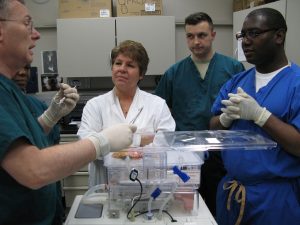Before a new drug can be prescribed, it needs to be tested to make sure it is safe and effective at treating the disease it targets. In a clinical trial, one group of participants will typically be given the new treatment, and their results will be compared with a control group. The control group may be given a dummy treatment, or they might receive the standard treatment for their condition.
Phases of clinical trials
There are several phases in clinical trials. Phase 1 trials are designed to test a treatment on a small number of people to see whether it is safe to test the drug on a larger number of people. Phase 2 and 3 trials examine the safety and effectiveness of a treatment in a larger group of patients, and phase 4 trials may be carried out after a drug is initially approved in order to further investigate possible side effects or what the long term benefits might be.
Recruiting for clinical trials
Completing clinical trials for a drug can be a long process, and the longer trials take, the longer it will be before a treatment can be made available to patients. Fast recruitment of participants can significantly shorten the overall study period, which also reduces the cost. There is, therefore, a big incentive for organisations running clinical trials to complete recruitment as quickly as possible.
Adaptive phase 1 studies, such as those run by https://www.richmondpharmacology.com/specialist-services/adaptive-phase-i-studies, can be challenging to recruit for, so understanding the recruitment process is particularly important. There is a large volume of literature that addresses recruitment challenges, but there are very few papers reporting nested randomized control trials of recruitment interventions.
The Recruitment Research in Clinical Trials (ORRCA) project was set up to bring together research into clinical trial recruitment in a way that will enable researchers to quickly access the most relevant information. ORRCA has created an online database of relevant research that is free to access. The literature review began in January 2015, and the database was launched in August 2016. As of October 2018, there are more than 3,500 recruitment articles contained in the database, and using this database makes it easier for researchers to make evidence-based decisions for recruitment strategies.
A report on the ORRCA project was recently published in the Clinical Trials journal.



